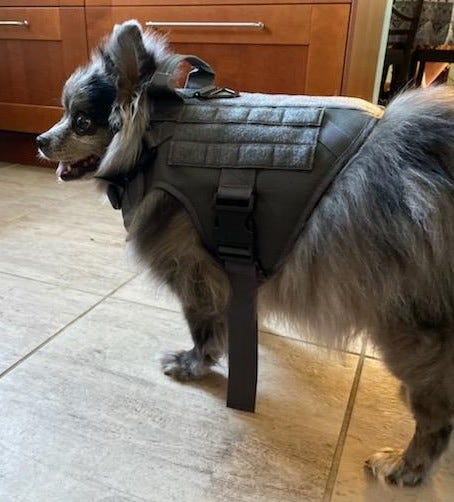The Prepper's Guide to Dogs

I don't need to explain the benefits of having a pet in your home. I have three dogs that I would move heaven and earth for. See Asher, below, the goodest boy that ever was.
But in a disaster, there's a lot to consider when it comes to your pet. They have different needs, a different diet, medications, and they can't move through the world as easily as people do. Today we’ll cover some universal pet preps, the intricacies of bugging out, and some overall benefits and drawbacks to going through an emergency with animals.
Universal Preps for Pets
There are four very important considerations to be had no matter your scenario:
- Your pet should be up to date on all vaccinations, and you should have proof.
- Your pet should be microchipped if they like to roam, or at the least tagged with current information. Make sure you have pictures of your pet (beyond just your phone, in case of loss of power).
- Water becomes a serious issue with pets. A dog or cat won’t know not to drink potentially contaminated water, so you will need to be sure to provide clean water and to watch them around other water sources. You should store in your home, along with water for any humans, up to a gallon per day per pet. Surplus water isn’t a bad thing to have, in the event that you’re thinking, “But my lizard hardly drinks water!” Store the extra in case.
- Food. While most dry pet food is already relatively shelf stable (anywhere from 12-18 months for dogs), you’re either going to want to be sure to store some of it in impermeable containers or to supplement your supply with canned food. If you’re like me, your dry food is sitting on the floor right now, and in a flash flood, sitting it on a counter is not going to be your first consideration. We naturally tend to have a good deal of food on hand for our pets because it lasts—just don’t let the bag get down to the bottom before you buy another.
Bugging Out with Your Fur Babies
Bugging out, as always, must mean that staying put is more dangerous than taking to the road. This could be because you have run out of supplies and need to seek more or because whatever emergency occurred has threatened your home.
You will need:
- Vet/vaccination records. During widespread disasters, pet owners frequently have to choose between shelter and their pets because they do not have proof of vaccination. Don’t let this happen to you.
- Vessels—because LifeStraw hasn’t figured out dogs yet. Collapsible bowls work well in a bugout bag. There are also pet water bottles, which will take up more space for their relative convenience.
- Water. An additional liter or more beyond what you carry for yourself.
- Food. Luckily, dry food isn't very heavy—it just takes up space. Try to fit in at least a couple days’ worth if you’re going to be on the road. If you have smaller animals, you can bump this up, but don’t overburden yourself.
- Medicine and prescriptions. Three days or more, and be sure to have them labeled.
- A carrier, a leash, a muzzle, a blanket, or toy that can keep your pet at hand, comforted, and quiet.
- Hygiene items—wipes, bags, etc.
Before you go, know where pet-friendly shelters are. Know where area vets are. Make sure that your destination, whatever it is, can accommodate your pet before you make a plan around it. If you’re able to use a vehicle to bug out, you should naturally take more supplies with you.

Something to consider, and relentlessly adorable, is that your animal (I say animal, I mean dog) might be able to help you in a bugout situation. Asher here is sporting a tactical dog vest that lets him carry some light miscellany. A bigger dog could tote around more—their own food, perhaps even water. We don’t use this vest much, because my boy just gets too hot, but it is the cutest thing ever and it could be useful if you’re at your carrying limit.
The Pros and Cons of Pets in the Apocalypse
My wife and I love our dogs to bits. We wouldn’t know what to do with ourselves without them. They organize our day, get us out of bed, and give us a reason to acknowledge the world besides ourselves. But in an emergency, I have to admit, they become a liability. All of our dogs are small and yappy. Asher is blind—he ain’t hauling bugout supplies anywhere without bonking into everything in his way. And that’s something we have to account for in our preps: we have to carry their weight. Do not be the kind of person who preps endlessly and when the day comes stares at their pet and says, “Well, shit.”
But maybe you’re one of those people with a smart, capable dog. They know how to fetch, roll over, and tie a bowline. Dogs are an obvious asset in home security (even our dogs are good as an alarm system) and they can be an asset out in the world as well. There’s a reason dogs have been our companions since we knew how to make fire. Dogs can hunt, they can track, and they can intimidate and dissuade potential threats.
Beyond all these pros and cons, though, is the fact that none of you are going to take this into account when getting your next pet, and you shouldn’t. Pets are some of the best parts of life, and you shouldn’t let the worst possibilities cloud that. What you should do, however, is include them in your preparations. Don’t let your pet down by forgetting about them until it’s too late. Stock up on their needs, and be sure to include them in your emergency plans. You shouldn’t be the reason they get left behind, and they shouldn’t be the reason you do, either. Being prepared will prevent that.


